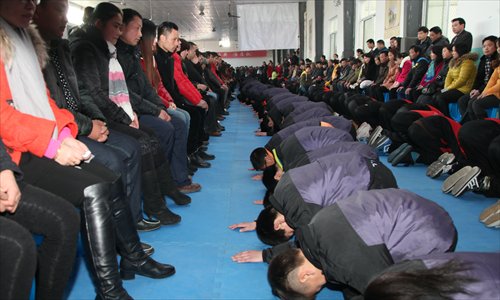HOME >> CHINA
Students perform worship rites
By Liu Xin Source:Global Times Published: 2015-1-13 0:33:01
Ceremonies follow Xi’s support for Confucianism

Students perform kowtows to their parents in Binxin School in Shanghai on Sunday. Photo: Courtesy of Binxin School
A private school in Shanghai asked more than 750 students to perform kowtows and prostrations as a symbolic sign of obedience in Confucianism at a grand ancestor worship ceremony on Sunday, renewing public discussion on similar traditional Chinese ceremonies.
Students from Binxin School followed the host in wearing clothes resembling those worn during the Han Dynasty (206BC-AD220) and made three kowtows and nine prostrations, the deepest way of showing respect in Chinese history to the sacrificial altar while reciting the Confucian classics which describe an ideal world, according to the school.
More than 1,500 people, including parents, attended the ceremony and the students were required to walk on their knees and express gratitude to their parents who were touched to tears.
"Filial obedience is one of the precious values in the traditional culture and we hope students have a better understanding of it in the ceremony," Fu Jianqing, the school president, told the Global Times.
Fu said that the school demands all students and teachers to recite Di Zi Gui, a book which sets standards for being a good student and child, and to practice the moral code highly recommended by Confucianism.
As a military-style boarding school which features lessons on martial arts and Peking Opera, students bow to the statue of Confucius before they begin their classes every day, Fu said.
China has witnessed similar ceremonies recenstly, featuring Confucianism, after President Xi Jinping stressed the importance of Confucianism and traditional Chinese culture.
"Confucianism, along with other philosophies and cultures taking shape and growing within China, is a record of spiritual experience and the rational thinking of the nation. These cultures are believed to help modern people find spiritual roots and continue to nourish China," Xi said at last year's seminar to mark the anniversary of the birth of Confucius.
Xi also visited the Confucius Temple in Qufu, Shandong Province in 2013 and endorsed two books on Confucianism.
Yao Zhongqiu, a Confucian scholar, told the Global Times that the kowtow in the school's ceremony is part of traditional Chinese etiquette and culture, which can help students become "more noble and civilized."
But others find the ritual superficial. "The ceremony shows the teachers' limited understanding of traditional Chinese culture. The school is doing it for show," said Chu Zhaohui, a research fellow from the National Institute of Education Sciences.
"President Xi and other national leaders have paid more attention to the development of the traditional culture in recent years," Fu added.
Posted in: Society